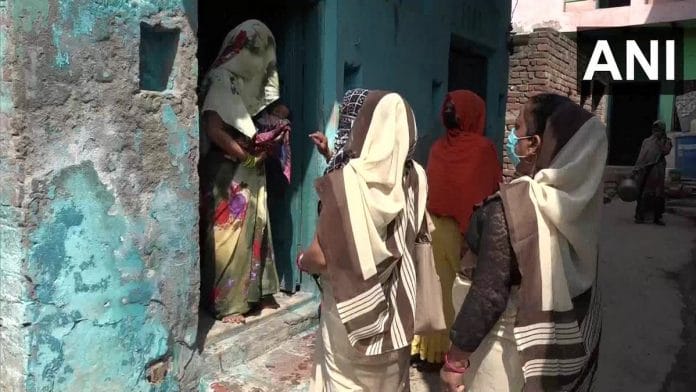New Delhi: Community engagement by ASHA workers has been a successful strategy in enhancing India’s national response to Covid-19, said the second report of a WHO-established independent panel to study global responses to the pandemic.
Called the Independent Panel for Pandemic Preparedness and Responses (IPPPR), the report was published Monday. It has highlighted how the deployment of “a cadre of million women social health activists” has helped India’s Covid-19 surveillance.
IPPPR was established by the WHO Director-General in response to a World Health Assembly resolution. The 13-member panel is headed by former New Zealand Prime Minister Helen Clark and the former president of Liberia, Johnson Sirleaf. Former Union health secretary Preeti Sudan is a member of the panel.
“IPPPR is releasing its second progress report to the Executive Board. This is work in progress. Final recommendations will be made in May to the World Health Assembly,” Sudan told ThePrint.
Union Health Minister Dr Harsh Vardhan is the chair of the Executive Board. The first report was submitted to the board on 5 November 2020.
The report has also highlighted how China and the WHO should have taken more forceful actions to contain the pandemic.
Also read: India’s Covid vaccine drive in numbers: 66 cr doses, 2 lakh vaccinators, 70 walk-in freezers
Successful community engagement via ASHA workers
The report cited ASHA workers in India, polio workers in Nigeria and Thailand’s village healthcare workers for successfully using community engagement to respond to the pandemic.
“Community engagement has been a successful strategy to enhance national responses. This has included the deployment of community health workers; for example, the cohort of 50,000 community informants established for polio detection in Nigeria was also engaged in the COVID-19 response, Thailand’s network of village health workers has been a key support to the response there, and India has drawn on a cadre of a million women social health activists,” the report said.
It also highlighted how resistance to masks and vaccines, and preventive measures cannot be done by traditional healthcare systems alone.
“Systems for health require substantive community engagement at every step of pandemic preparedness and response, from early detection and alarm to the dissemination of reliable information throughout a community, including effective ways to prevent, care for and treat infection,” said the report.
ASHA workers were recruited under the National Rural Health Mission (NHRM) that was launched in 2005. These workers act as a bridge between public healthcare and various communities. They are usually tasked with antenatal and care for newborn babies, encouraging immunisation, family planning and treating basic illnesses.
Nearly 9 lakh ASHA workers across India were engaged to fight the pandemic.
China, WHO acted slowly
The report said China and WHO should have taken more forceful steps to contain the pandemic.
“What is clear to the panel is that public health measures could have been applied more forcefully by local and national health authorities in China in January,” the report noted.
The panel also said that despite information about cases in multiple countries, only some of them responded “to the evidence of an emerging pandemic”.
Indicting the WHO and other countries for ignoring the information, the panel also noted how WHO’s Emergency Committee did not meet till the third week of January despite the first case in China’s Wuhan emerging on 31 December.
The report also questioned the WHO for not declaring the pandemic earlier. “Although the term pandemic is neither used nor defined in the International Health Regulations (2005), its use does serve to focus attention on the gravity of a health event. It was not until 11 March that WHO used the term,” it said.
The panel, however, said the WHO was limited in its powers to do the job expected of it. “The panel is struck that the power of WHO to validate reports of disease outbreaks for their pandemic potential and to be able to deploy support and containment resources to local areas is gravely limited. The incentives for cooperation are too weak to ensure the effective engagement of States with the international system in a disciplined, transparent, accountable and timely manner,” it said.
Also read: Not paid for months, 22,000 Delhi civic workers threaten to boycott vaccine drive duties






